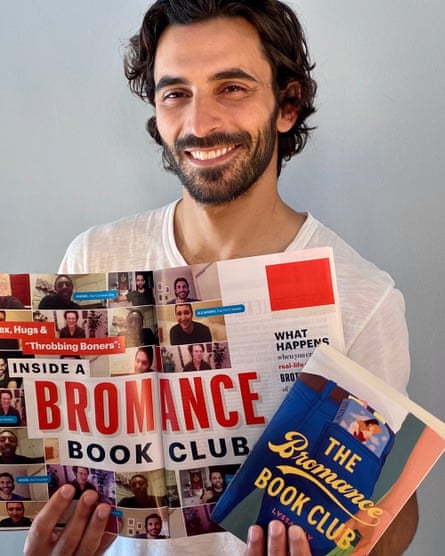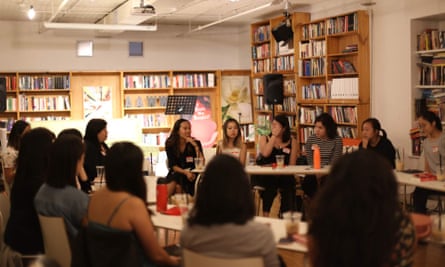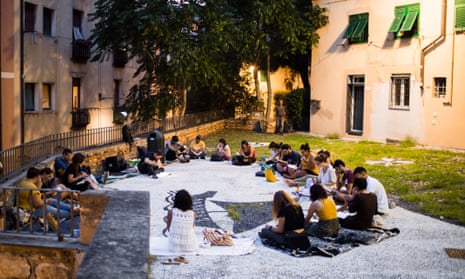In a year when we have found ourselves physically apart and cooped inside, people around the world have rediscovered the magic of books. Yet what of the book club? While some are on hiatus and some are plodding along, others have been thriving during the pandemic, with lockdowns inspiring people to start their own in order to connect with like-minded readers. The Guardian spoke to four book clubs that are fostering thriving communities online.

The Silent Book Club
This was founded by Guinevere de la Mare and Laura Gluhanich in 2012. “I was always dreading book club. I either wasn’t into the book or I felt like I had to say something insightful about it,” de la Mare says. Frustrated at their options, the duo began to meet at a local bar in San Francisco to quietly read their own books. “Reading in public really struck people as odd because they were always asking what we were doing,” de la Mare recalls. Soon friends and strangers asked to join in on what became the Silent Book Club.
Today, the club has exploded to 285 chapters across 37 countries. Since the start of the pandemic, around 30 new chapters have formed. “I’m not shocked by that,” de la Mare says. “They are providing community at a time when so many people feel isolated.”
While new chapters have started, older ones have adapted. When Covid hit Italy earlier this year, the country’s chapters swapped meetings at cafes and art galleries for the far less romantic Zoom. The Genoa chapter doubled its participants, while the Turin, Bari and Rome groups all held joint meetings for the first time. “We felt deeply united by coming together like that, which we needed in the worst days,” says Enrico Nada, co-founder of the Turin chapter. The migration online has resulted in groups in Hyderabad, Delhi and Bangalore coming together online, streamed writer talks, and at least one collective short story (set in quarantine, naturally).
While some chapters have moved back to the original in-person (and silent) format, de la Mare expects to see virtual elements remain: “People have enjoyed some of these changes, so I can see chapters blending some of both.”
The Bromantics Book Club

“At a time when men around the world are examining masculinity, this seemed like an important book club to start,” says Jason Rogers, the LA-based writer and Olympic fencer behind the Bromantics. Once a month Rogers and several men gather to discuss a romance novel to “better understand love, sex and relationships”. Rogers found inspiration after he read Lyssa K Adams’ book, The Bromance Book Club, in which a group of alpha male athletes secretly devour the genre.
The real book club is small, with around half a dozen men (mostly in their 30s) scattered around North and South America meeting over Zoom to dissect a novel, before veering into men’s group territory. “Most guys aren’t used to talking about their intimate lives, so this is a space to do that and support each other. The books are a gateway to get there,” Rogers says.
The books are not chosen simply for entertainment. As chick lit and romance novels tend to be written for the female gaze, they allow male readers to learn valuable lessons that are not always imparted in male-directed entertainment. “The books bring up discussions about intimacy beyond the physical … about issues of consent and emotional vulnerability,” Rogers says.
The Bromantics was planned as an in-person club before the pandemic, but Rogers says the online pivot has allowed the club to have greater reach. Since launching, he’s received interest from men all over the world. Rogers’ group is not currently open to new members (discussions are more productive and open if they’re kept small, he says), but he encourages people to start their own branch of the club (and it seems the idea may be catching on in the UK).

The Cosmos Book Club
The readers here are women with Asian backgrounds who gather to discuss literature written by Asian women and non-binary authors. “Growing up in the US, it felt rare to encounter stories that reflected the diaspora experience, especially ones by women,” says Cassandra Lam, co-founder. Books are selected from authors who have roots across greater Asia. “For some of our members these books can be the first time they’ve come across representation they really relate to,” Lam says. Not surprisingly, meetings usually stimulate conversations about members’ identities, politics and life experiences.

In non-Covid times, the club of mostly millennial and Gen Z-ers would gather in hip Brooklyn or Manhattan bookstores. Since moving online, though, they’ve noticed an increase in interest from people around the world. “We’ve had interest from people in other cities before, but now we can engage more with them,” says Lam. Members now join from Hong Kong, Europe and Australia.
Social unrest in the US has also played a role in the increased interest in the Cosmos club, and pushed it to expand its range. “Our network has been asking for black womxn authors who tackle big issues,” Lam says. “Expanding our purview is here to stay – now is as good a time as any to be reading broadly about race.” Recent online events have included a roster of Asian and black women writers and the talks have been among the group’s best attended events. “As a club, 2020 has been a big year,” Lam says. “We’ve almost got to update the mission because we have evolved.”
Black Girls With Magic and Books
This article includes content provided by Instagram. We ask for your permission before anything is loaded, as they may be using cookies and other technologies. To view this content, click 'Allow and continue'.
“I wanted to start something that was pure escapism during these bleak times,” says Dhonielle Clayton, who launched Black Girls with Magic during the pandemic. “We geek out about vampires, unicorns, magic potions – the fun stuff.” The club is open to all but is directed towards black women who have an interest in speculative writing – supernatural, futuristic and science fiction – written by black women and non-binary authors.
Clayton started the club because she was tired of the lack of attention black and non-binary writers of the genre received. “Not many clubs look at this genre specifically, and when they do it’s usually looking at books by white guys,” Clayton says. “I wanted to shine a light on those overlooked authors.”

Clayton, an author herself, also hopes to help readers become published writers. “I want the club to help usher in the next generation of speculative writers,” she says. To support this, Clayton has a roster of writers who discuss craft on the club’s Instagram account, which now boasts more than 2,000 followers. In the future, she is planning retreats where members can meet editors and publishers.
It’s the sort of club that Clayton wishes had been around when she was starting out as a writer: “There’s so much noise in the publishing industry that these writers so easily get lost – I’m just trying to make it easier and get more diverse books by diverse authors out there.”
